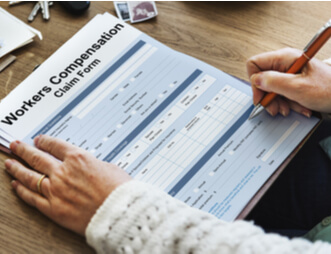Connecticut Workers' Compensation Attorney

If you’ve been hurt on the job in Connecticut, no matter how your injury occurred, you may be eligible for workers’ compensation benefits. Workers’ compensation payments can cover your medical expenses, offset your lost wages, and offer crucial support through difficult times.
Workers’ compensation is supposed to provide easy access to benefits, but in reality the process can be difficult. The experienced Connecticut workers’ compensation attorneys at Kocian Law Group are here to help you.
When you’re forced to deal with the physical pain and financial stress that often accompanies a serious on-the-job injury, securing workers’ compensation benefits is vital. Unfortunately, many injured workers are unfamiliar with the process of getting the full benefits they’re owed.
With a commitment to communication, excellence, and client satisfaction, the Connecticut workers’ compensation lawyers at the Kocian Law Group have the experience needed to help you get the benefits you’re owed. These benefits can help you get the treatment you need. With them, you can support yourself and your family as you work to get back on your feet and back to work.
Schedule a free, no-obligation consultation with our knowledgeable team to find out how we can help you.
Common Workplace Injuries in Connecticut
The type of occupation has a significant impact on the severity of an injury. For example, workplace injuries that happen on construction sites are often quite different from those that occur in offices.
According to the National Safety Council, the top five occupations with the most workplace injuries include:
- Service – Firefighters, police officers, and other first responders work in hazardous conditions and sustain injuries more often as a result.
- Transportation and Shipping – USPS, UPS, FedEx, and other delivery drivers are at a higher risk of being involved in traffic accidents.
- Manufacturing and Production – Factory jobs and manufacturing positions require workers to use heavy, complex machinery, and may work at elevated heights, near hazardous materials, or other dangerous conditions.
- Installation and Maintenance Repair – Electricians and other workers who deal with on-site installations can be injured in lifting, electrical, and fall accidents.
- Construction – Construction sites pose a variety of serious risks to employees. Even when a worker is following protocol, they could still sustain serious injuries in an accident.
The National Safety Council reports the following three factors as the most common causes of work-related injuries:
- Overexertion – 33.54% of occupational injuries occur from repetitive motions and lifting and lowering heavy objects.
- Contact with Equipment and Objects – 26% of workplace injuries affect workers who are caught, compressed, or pinned by machinery or heavy machinery.
- Slips and Falls – Injuries from slip and fall accidents account for 25.8% of workplace injuries.
No matter the severity of your workplace injury, the Connecticut workers’ compensation program is intended to help employees pay for injury-related expenses and a percentage of their lost wages. Unfortunately, applying for and receiving the benefits you’re entitled to can be challenging.
Be sure to consult with an experienced worker’s compensation attorney for assistance and rest easier knowing you have a knowledgeable advocate on your side.
What Do Connecticut Workers’ Compensation Benefits Cover?
Workers’ compensation benefits in Connecticut include temporary partial disability, temporary total disability, permanent partial disability, permanent total disability, discretionary benefits, and death benefits.
When discussing workers’ compensation, it’s important to understand the concept of maximum medical improvement (MMI). MMI occurs when a worker’s medical condition will not improve with any continued treatment. Eligibility for certain workers’ comp benefits will depend on if, and when, a doctor determines that a worker has reached MMI.
- Temporary Partial Disability (TPD) Benefits – If your injury doesn’t completely prevent you from returning to work, it may still impact how much you are able to earn. When this happens, Connecticut workers’ compensation helps compensate for the difference in your wages. TPD benefits cover 75% of the difference between what you earned before your injury and what you are able to earn after. For example, if you earned $800 weekly before your disability and $600 weekly after, TPD pays 75% of the $200 difference.
- Temporary Total Disability (TTD) Benefits – Temporary total disability benefits are available to workers whose injuries prevent them from working entirely for a limited period. TTD benefits account for 75% of workers average weekly pay post-taxes. Unless a worker’s disability lasts for longer than one week, these benefits are not paid within the first three days of missed work.
- Permanent Partial Disability (PPD) Benefits – You may be eligible for permanent partial disability if a work-related injury has caused you to lose function or significant use of a certain body part. A comprehensive list of these body parts and the corresponding benefits are detailed in the Connecticut schedule. Depending on the impacted body part and lost function, the timeline that you are able to receive benefits will vary. For example, the Connecticut schedule outlines the following:
- Dominant arm – 208 weeks
- Non-dominant arm – 194 weeks
- Leg – 155 weeks
- Hearing – 104 weeks
- Sight in one eye – 157 weeks
If you still have partial use of a limb or sensory ability after an injury, the related benefits will adjust proportionally. In Connecticut, you may also be eligible for benefits for facial, neck, or head scarring and disfigurement injuries. Depending on the severity of the disfigurement and the location of the scar, the Workers’ Compensation Commission may grant compensation for these injuries for up to 208 weeks.
- Permanent Total Disability (PTD) Benefits – Once MMI has been reached, workers are considered for total disability. Connecticut considers workers eligible for PTD benefits when the following factors are present:
- Loss of eyesight
- Loss of both hands
- Loss of feet
- Loss of one hand and one foot
- Paralysis affecting two limbs
- Mental disability caused by head or brain injury
PTD benefits account for 75% of a worker’s weekly wages post-tax. Workers eligible for PTD benefits may be able to collect these benefits for life.
- Discretionary Benefits – Workers whose PPD payments end may be eligible for other, discretionary benefits when their injuries cause ongoing wage loss. Like temporary permanent disability benefits, discretionary benefits account for 75% of the post-tax difference between the initial weekly wage and the post-injury wage. Depending on the severity of wage losses, these benefits could be awarded for up to 250 weeks.
- Death Benefits – If a work-related accident or injury results in a worker’s death, their dependents may be eligible to collect death benefits. Death benefits are typically 75% of the deceased worker’s weekly earnings after taxes. Insurers may also cover funeral and burial expenses up to $4,000.




